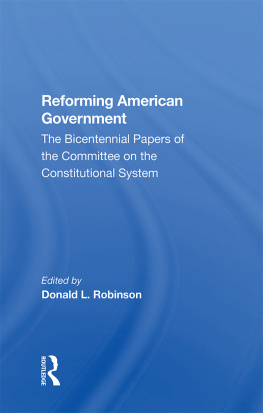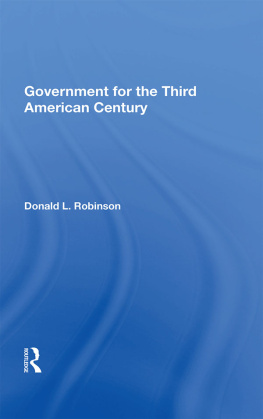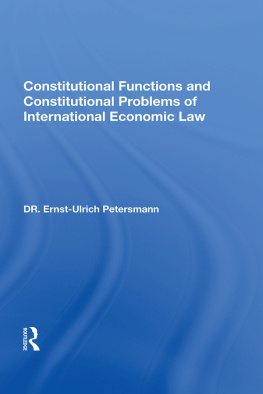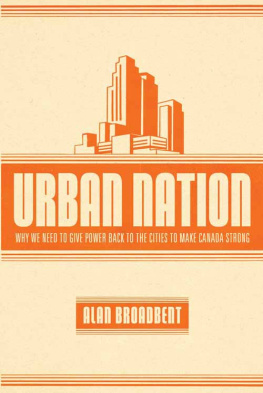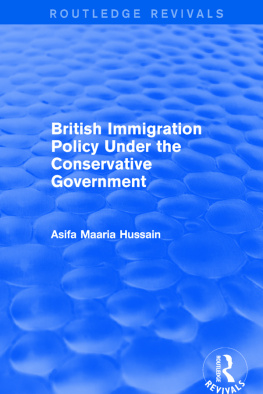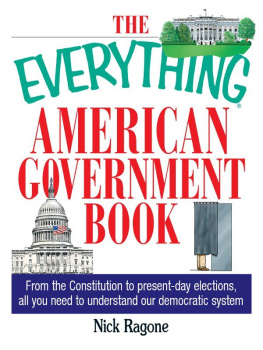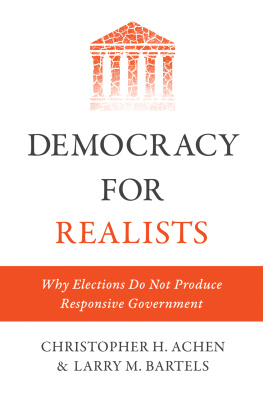Reforming American Government
About the Book and Editor
Government deficits, the spiraling imbalance of trade, inconsistencies in foreign policy, illegal immigration, unemployment, the decay of our cities, the abuse of the environment, the staggering cost of elections, and the piracy of special interest groupsthese problems and a host of others have led thoughtful citizens to question whether our political system is capable of meeting the challenge of modern governance. We stand in awe of the wise men who framed the Constitution nearly two centuries ago, but as they themselves anticipated, changing circumstances demand a reassessment.
As we approach the bicentennial anniversary of the Constitution, such an assessment is being undertaken by the Committee on the Constitutional System, a group of two hundred prominent citizens (among them present and former members of the Senate and House, Cabinet and White House staff, governors, party officials, members of academia, journalists, lawyers, and labor, business, and financial leaders). Reforming American Government includes both a discussion of the problems of modern governance and an assessment of various proposed reforms. Some of the proposals call for changes in party rules for nominating candidates; some for federal statutes to funnel campaign finances through the parties. Others present drafts of Constitutional amendments designed to coordinate the terms of representatives, senators, and the president, to allow legislators to serve in administrative positions, and to provide for new elections in the event of deadlock.
The book presents draft language for each of these proposals and an assessment of "pros and cons." Also included is a discussion of aspects of the French, West German, and English constitutions that shed light on American possibilities for governmental reform.
The Committee, which is nonpartisan and nongovernmental, is chaired by Senator Nancy Landon Kassebaum, Republican of Kansas; C. Douglas Dillon, member of the Eisenhower and Kennedy cabinets; and Lloyd Cutler, former White House Counsel to President Jimmy Carter. It has taken no position on the proposals it has considered. Its purpose is to use the occasion of the bicentennial of the Constitution for a candid assessment of the performance of our governing institutions and to stimulate a nationwide debate about alternative structures and processes.
Donald L. Robinson, editor of the volume, is professor of government at Smith College.
Reforming American Government
The Bicentennial Papers of the Committee on the Constitutional System
edited by
Donald L. Robinson
First published 1985 by Westview Press
Published 2019 by Routledge
52 Vanderbilt Avenue, New York, NY 10017
2 Park Square, Milton Park, Abingdon, Oxon OX14 4RN
Routledge is an imprint of the Taylor & Francis Group, an informa business
Copyright 1985 by The Committee on the Constitutional System
All rights reserved. No part of this book may be reprinted or reproduced or utilised in any form or by any electronic, mechanical, or other means, now known or hereafter invented, including photocopying and recording, or in any information storage or retrieval system, without permission in writing from the publishers.
Notice:
Product or corporate names may be trademarks or registered trademarks, and are used only for identification and explanation without intent to infringe.
Library of Congress Cataloging in Publication Data
Main entry under title:
Reforming American Government
Bibliography: p.
1. United StatesConstitutional law. I. Robinson,
Donald L., 1936 . II. Committee on the Constitutional System.
KF4549.W67 1985 342.73'03 85-3199
347.3023
ISBN 13: 978-0-367-28537-1 (hbk)
Table of Contents
, Nancy Landon Kassebaum, Lloyd N. Cutler, and C. Douglas Dillon, Co-Chairs, Committee on the Constitutional System
, Donald L. Robinson
, Charles Hardin
, Lloyd N. Cutler
, C. Douglas Dillon
, Nancy Landon Kassebaum
, Lester Thurow
, Don K. Price
, Arthur M. Schlesinger, Jr.
, Lloyd N. Cutler and C. Douglas Dillon
, James M. Burns
, Neal R. Pierce
, Elmer Staats
, Alexander Heard
, James L. Sundquist
, Lloyd N. Cutler
, Newton Minow
, Woodrow Wilson
, Harold Laski
, Thomas K. Finletter
, Charles Hardin
, Henry Reuss
, James M. Burns
, Dick Thornburgh
, Kevin Phillips
, Theodore C. Sorensen
, William Yandell Elliott
, Henry Reuss
, Hans A. Linde
, Samuel Beer
, Allan Sindler
, James L. Sundquist
, Bob Eckhardt and Charles L. Black, Jr.
, James L. Sundquist
, C. Herman Pritchett
, Austin Ranney
, A. E. Dick Howard
, Lloyd N. Cutler
, Michel Debr
Guide
Nancy Landon Kassebaum , Lloyd N. Cutler , and C. Douglas Dillon , Co-Chairs, Committee on the Constitutional System
Our society was one of the first to write a Constitution. It reflected the confident conviction of the eighteenth century Enlightenment that explicit written arrangements could be devised to structure a government that would be neither tyrannical nor impotent in its time and to allow for future amendment as experience and change might indicate.
We are all children of this faith in a rational written arrangement for governing. Our faith has encouraged us to adopt occasional changes in our Constitutionfor which the framers explicitly allowedthat have assisted us in adjusting to the changes in the world in which the Constitution must function.
As we prepare to celebrate the bicentenary of this remarkable instrument, we must not stand completely in awe. We must not treat it as immutable, like the Ark of the Covenant. We must remember that while it entrenched the Bill of Rights, it also entrenched the institution of slavery, and that only the built-in capacity for amendment enabled us to correct that evil.
The framers were bold and daring men. Twice in their own lifetime, and at great risk to themselves, they changed their own form of government. They left us a charter that can and should be changed with the times. They did not make amendment easy or quick, to suit the whims of a political moment, but they made it possible after enough deliberation so that a lasting consensus for change could be formed. As Thomas Jefferson wrote: "I am certainly not an advocate for frequent and untried changes in laws and constitutions.... But I know also that laws and institutions must go hand in hand with progress of the human mind. As that becomes more developed, more enlightened, as new discoveries are made, new truths disclosed, and manners and opinions change with the change of circumstances, institutions must advance also and keep pace with the times."
All of us appreciate the balance and flexibility that the Constitution has built into our system of government. But our appreciation must be honest and clear-eyed. We must see the weaknesses that have appeared over two centuries as well as the enduring strengths. The rarity of constitutional amendments demonstrates how difficult it is to improve on the work of the framers. The same history also demonstrates that when the need is great enough, the required national consensus can be found.

